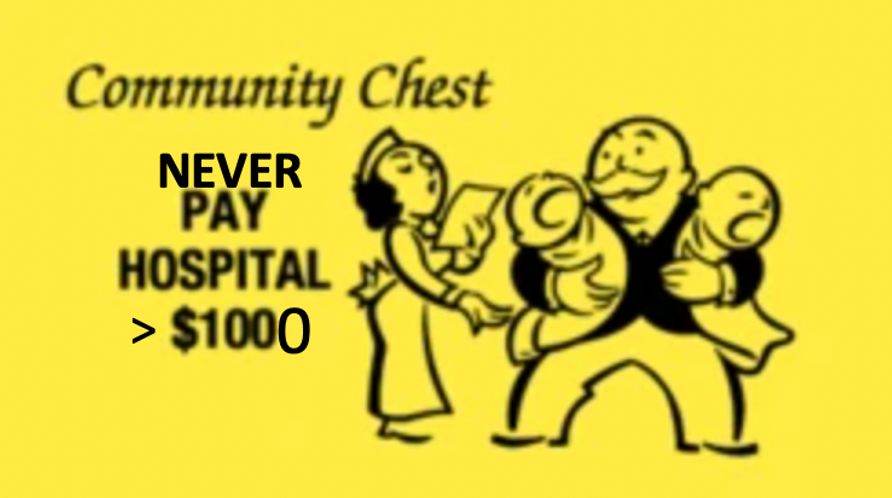Quizzify earns total victory in surprise bill dispute
- Jun 29, 2021
- 3 min read
Updated: Aug 25, 2021
Imagine having a surprise bill reduced 95.3%, from $14,269.30 to $674. And that's without going to court, without conceding a nickel from your initial offer, without trying to qualify for an oxymoronic “financial assistance program,” without hiring an attorney, and even without agreeing to an NDA. (We’ll name the hospital on request. To name it here seems like piling on, and we’re gloating enough as it is.)
That was the good news delivered to Florida resident James Hamilton this week, following a harrowing six months (for him, that is – we knew all along that the outcome was preordained) that even involved a collections agency. You may have tracked the original dispute in our March webinar. The hospital folded because:
James used the elegant Quizzify surprise bill “prevent consent” instead of agreeing to the hospital’s form language;
·Uber-benefits advisor Therese Costa ensured he got the wording just right.
Also it is time for special shout-outs to Marshall Allen for his ongoing support (he even put this language in his killer new book), Marty Makary for inventing the “battlefield consent” and Marilyn Bartlett for implementing the first comprehensive reference-based pricing. All we did at Quizzify was combine Marty’s chocolate and Marilyn’s peanut butter into a Reese Cup.
And a shout-out to MedWatch, for repricing this bill to 2x Medicare, presenting it clearly, and having the pricing stick, down to the penny. We recommend their service highly.
This popular Quizzify consent has probably been used hundreds of times by now, and this is the third time a user has gone public. This is also the first time the language got challenged after the fact. Until now, it has always gotten accepted on the spot. Sometimes it involves a supervisor -- who in one case exclaimed: "Wow. That's pretty smart.” Our Prevent Consent has even been featured in the New York Times.

But there is nothing like a first-hand real-time, completely documented experience to make the point that Quizzify is the Simone Biles of vendors. Our accomplishments in employee experience/employer financing involve feats that other vendors don’t attempt, most consultants don’t know about, and most employers assume are too good to be true.
Others include our innovative EEOC indemnification and our 100% employee engagement guarantee. In addition, we have introduced employees to a painless, inexpensive and quick solution to replace drilling-and-filling of cavities, and most recently, to a dramatic new breakthrough in premature birth prediction that should hopefully reduce premature births.
Here's the surprise bill story, in pictures
James was wise enough, with the help of benefits consultant Therese Costa, to write in the Quizzify consent, since his insurance card didn't carry it. Quizzify recommends that it appear on the card itself. Here is his written consent:

The hospital could have said no to the consent, but they would have to treat him anyway under a federal law (EMTALA) which we have exploited in order to create this consent. In case you can't read the actual wording, go with this newer version instead. It includes needing to see the itemized bill before paying it. (James had a heckuva time prying that out of them, so now it's a requirement.) It also covers the possibility that someone will sign the form consent and give them an insurance card with this language on it:
Superseding other consents, I consent to responsibility (including insurance) for up to 2 times Medicare following receipt of an itemized bill for appropriate treatment.
Let's next review the bill. First, for the hospital, which is in-network:

Let's add the physician bill for $1907 that was "negotiated" down to $1716.30. We have no idea how they managed to negotiate with the physician, because she never showed up to treat him, let alone to talk price.

As you may be aware, the Quizzify "prevent consent" language disallows the latter bill in its entirety, because it is based on Medicare prices and policies, which do not include paying for no-show docs.
Medwatch was kind enough to analyze what Medicare would have paid, and then per the agreed-upon consent, multiplied that by 2:

James then wrote a check for that exact $674.30, which was marked on the back as "Payment in full for agreed-upon fees." In the old days, endorsing and cashing that check would itself have been offer-and-acceptance, but these days it is just evidence of a contract. One way or the other, it was cashed.

This multibillion-dollar hospital system evidently at first did not realize they had been beaten at their own game, because they sent the bill to collections anyway, and James got this letter from "Your Patient Financial Services Team."

Following a couple more letters and phone calls from James and his "financial services team" that caught the attention of the C-Suite, the hospital finally caved, and here is the letter James received. Game, set and match to us:

You may remember this old electronics retail chain?

What this smackdown should teach dishonest providers is that Nobody beats The Quiz.



